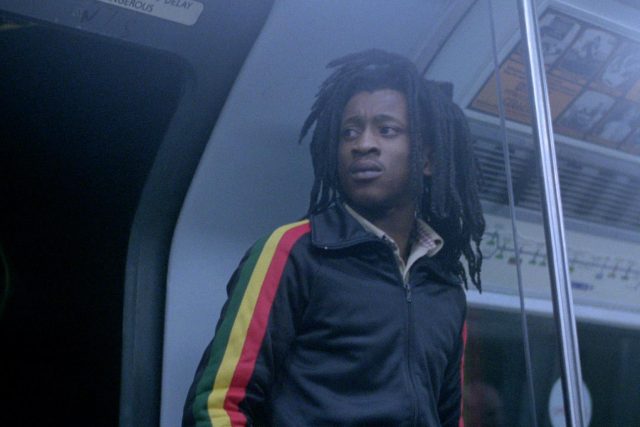Babylon: Riddim Collision, by David Bax

Never before released in the United States, Franco Rosso’s 1980 Babylon finally arrives in theaters in a new restoration approved by the film’s cinematographer, the lauded Chris Menges (Kes, The Killing Fields), and brand new subtitles. The color timing of the new transfer is impeccable, with a tactility and hazy depth that pulls the viewer into Menges’ stark but vivacious compositions. And those subtitles are crucial, given that most of the film’s dialogue is in thick Patois.
Largely narrative-free, Babylon takes place among London’s reggae sound system scene, in which dance parties are organized around certain DJs and MCs and the records they spin at incredibly high volume. Brinsley Forde’s Blue is the character with the most screen time and story. A low paid, poorly treated auto mechanic by day and a sound system MC by night, Blue struggles against a traditional family that doesn’t understand his pursuits and desires; against the life of crime into which some of his peers are drawn; and, most importantly, against a racist city full of racist institutions that seek to obliterate the presence and lifestyle of him and his friends.
In the film’s early sections, Rosso immerses us in the subculture, emphasizing the way a group of like-minded individuals can inhabit a sort of liminal small town in the midst of a major city by only occasionally letting us glimpse the faces of the (always white) passersby, usually when they are momentarily puzzled or shocked by our protagonists’ speech patterns or loud music. As the film goes on, though, more and more white faces, most of them angry or condescending, make their way into Menges’ frames; Blue’s reggae paradise is in constant danger because, in England as much as in America, young black men having a good time always seem to be a threat to the comfort of white people.
Before the walls start to close in, though, Babylon is an exceptionally enjoyable hangout movie. Blue and his friends Beefy, Ronnie, Lover, Errol and others smoke weed, play pool and plan their sound system’s next gig. Rosso highlights the interchangeable looseness of these vignettes by fading out and back in between them. This might all be happening on the same day or over the course of weeks; the effect would be the same.
It can’t go on forever like that, though. What starts as a nosy neighbor complaining about the noise soon becomes National Front thugs chucking bottles at our heroes and cops harassing and arresting them for no reason. When one woman tells them to go back to their own country and a furious Beefy shouts, “This is my country!”, it’s clear that the roots of Brexit were already taking hold 40 years ago, just like the election of Donald Trump here sprouted from decades of mounting xenophobia and hatred.
Babylon is a pulsating document of a time and place as well as a piece of connective tissue from the past to the present. Its restoration and re-release are a boon both because of the film’s undeniable quality and because of its somehow still radical empathy. It didn’t escape my notice that the filmmaker and his co-screenwriter are white men but it did make me wonder who the movie might be best suited for. Maybe it can serve as a reminder to those who voted Green Book Best Picture that racism has never been cute nor ended tidily.


























West Indians came over to the UK because they were part of the commonwealth, and the British Nationality Act of 1948 gave all such people citizenship (though many came over on Windrush before it passed). Brexit would merely sever the UK from continental Europe (and all the “Polish plumbers” granted access to its common labor market).